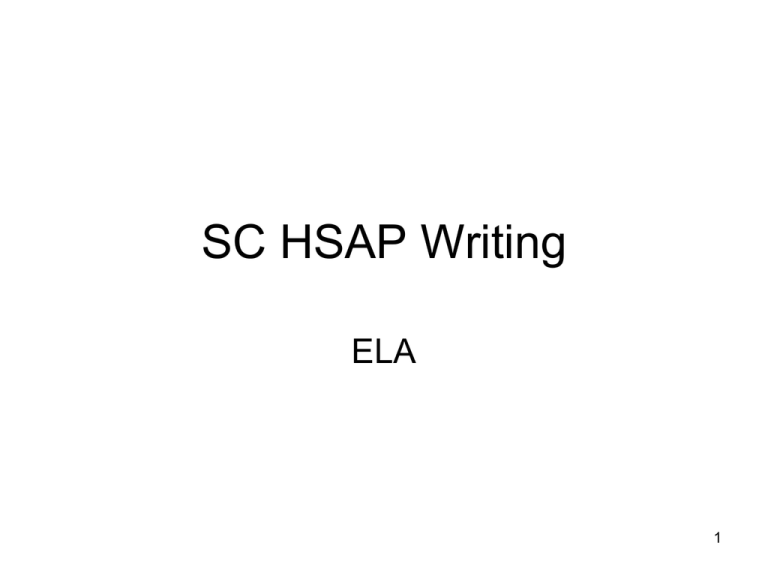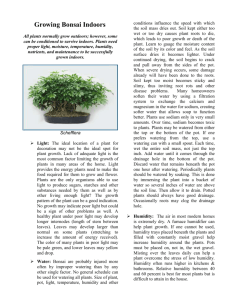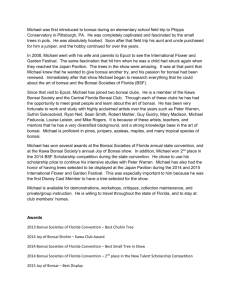HSAP Writing Rubrics
advertisement

SC HSAP Writing ELA 1 SC HSAP Extended Response Writing 2 Writing Strategy 3 4 Extended Response Directions Write your composition and mark your answers to the multiple-choice questions directly in your test booklet. Use only a Number 2 pencil to write your composition and mark your answer choices. Writing Prompt • Read the prompt carefully before you begin to write. • Use a dictionary and thesaurus to write your composition. • Be sure your composition addresses all parts of the prompt. • Refer to the checklist below the prompt with the features of good writing. • Do your pre-writing on the separate, lined scratch paper provided—your pre-writing WILL NOT be scored. • Allow enough time to write your FINAL composition in the test booklet on the three lined pages marked “Writing” at the top. 5 Writing Prompt If you could spend a day with a person you have read about or seen in a movie, who would that person be? How would you spend your day with that person? Write an essay in which you explain how you would spend your day with this person and why it would be so special. Include detailed descriptions and explanations to support your ideas. 6 If you could spend a day with a person you have read about or seen in a movie, who would that person be? How would you spend your day with that person? Write an essay in which you explain how you would spend your day with this person and why it would be so special. Include detailed descriptions and explanations to support your ideas. Re-read the directions! person? movie or read about Make sure you haven’t explain how you would spend your day missed anything! why it would be so special details to support 7 Write an essay in which you explain how you would spend your day with this person and why it would be so special. Include detailed descriptions and explanations to support your ideas. I would spend my day detail Person? X detail detail it would be so special because details why special 8 Write an essay in which you explain how you would spend your day with this person and why it would be so special. Include detailed descriptions and explanations to support your ideas. I would spend my day 1. detail Person? X 2. detail 3. detail it would be so special details why special 9 If some ideas and details are not relevant GET RID OF THEM! 10 Now you are ready to write your essay Topic Statement (thesis) – Introductory paragraph 1 paragraph for each general statement with details to support Transition words – (as a result, likewise, by comparison, etc) Concluding paragraph – restate thesis & summarize 11 Now, let’s check the scoring rubric! CONTENT/DEVELOPMENT ORGANIZATION Has a clear introduction, body, and conclusion. Provides a smooth progression of ideas throughout the writing. Presents a clear central idea about the topic Fully develops the central idea with specific, relevant details Sustains focus on central idea throughout the writing VOICE CONVENTIONS •Uses precise and/or vivid vocabulary appropriate for the topic •Phrasing is effective, not predictable or obvious •Varies sentence structure to promote rhythmic reading •Strongly aware of audience and task; tone is Minor errors in standard written English may be present. consistent and appropriate 12 SAMPLES Writing Prompt Suppose you could go back in time and spend a day with a famous person in history. Think about who it would be and what you would do. Write an essay in which you identify the famous person and describe what you would do for the day. 13 Student Samples Introductory paragraph 14 restate A clear central idea is evident: …it would be President Lincoln. This idea is fully developed with specific, relevant details: Lincoln was the president during the Civil War and was shot and killed by John Wilkes Booth inside Ford's Theatre while watching a play called, "Our American Cousins." Several insightful moments are evident: He would also get to see how things work in todays society compared to when he was president…This would probably be amazing for him to see the memorial grounds and graves that are still there to this day…. Focus 15 is maintained throughout. Content and Development 1 Although a central idea is evident, details are sparse: the number three race car driver. The attempt to elaborate results in a vague repetition of ideas rather than in details about how the day would be spent: I just would Love to spend a day with him. I would Just sit around Just so I could say I seen and hung out with The number three race car driver. 16 Added a title Organized by: •Time sequence •Space (location) 17 Organization 4 A skillful organizational strategy is used that includes transitions to move the reader chronologically through the day's activities: Then… After that… And right before I would leave. In addition, a spatial organizational strategy smoothly shifts the reader to the various locations in which these activities take place: …sit in the front room…take a walk and look at her garden…we would come inside…she would take me into her bedroom…. An effective introduction and solid conclusion further demonstrate strong control over this domain. 18 Word Choice Sentence Variety Awareness of Audience & Task Writer's Voice & Tone 19 Voice 3 Vivid, precise vocabulary choices are used throughout the response: had a strong passion for learning…her tragic love story involving Marc Anthony…spread her fame…triumphs and hardships. An appropriate tone used throughout also provides a glimpse of the writer behind the words: I, myself, have a strong passion…Personally, I would be happy just sitting by the Nile…I would take the opportunity in a heartbeat…. Strong audience awareness is evident due to the use of specific details to introduce the topic: She ruled as an ancient Egyptian queen…. Varied sentence 20 structure contributes to the fluency and the strong writer's voice. Voice 1 Simple vocabulary is used throughout: …he was a very brave man. He had a lot of experience with the wars…. A lack of sentence variety makes the reading monotonous. Although Eisenhower is identified as a five-star general, little audience awareness is evident beyond that. The tone is somewhat flat. 21 Conventions 4 Rules of standard English are applied consistently with only minor errors. Sentences are constructed correctly. Punctuation is mostly correct, with appositives being appropriately set off with commas: Andrew Jackson, our seventh president, had…Jackson would make a toast, to me of course, for my…. Capitalization and spelling are correct. Despite a somewhat awkward verb tense change from past perfect [we would] in the body to past tense in the conclusion, this writer demonstrates strong control over this domain. 22 spend Florida Conventions 1 Serious errors in sentence formation, spelling, punctuation, and usage interfere with the writer's meaning: When I was in flowery with here. I went to disey world with here we tout to ride a lot of rides with and my cras would go with here. While it is possible to understand some of what the writer is saying, the errors across all of the categories of this domain indicate the writer does not have control of conventions.23 End of Extended Response Click to go to SC HSAP Constructed Response Writing 24 Constructed Response After reading a passage you will be asked to respond to the passage. 25 Writing Prompt Directions As you write, be sure to • consider the audience. • develop your response around a clear central idea. • use specific details and examples to support your central idea. • organize your ideas into a clear introduction, body, and conclusion. • use smooth transitions so that there is a logical progression of ideas. • use a variety of sentence structures. • check for correct sentence structure. • check for errors in capitalization, punctuation, spelling, and grammar. 26 27 Constructed-Response Questions Directions • Write your response to each question on the lines below the question. • Use only the lines provided for your response. • Do not write beyond the lines or in the margins. • Continue with the test after you have finished each response. 28 Writing Prompt Decide whether you would enjoy the hobby of Bonsai. Using information from the selection, explain why or why not. As you write, be sure to support your response with evidence from the selection. The selection follows (next slide) Teachers can print reading passage 29 Art Imitating Life Bonsai is the ancient art of growing and cultivating miniature trees. Although the art of Bonsai originated in China around 225 B.C.E., it is quite popular today in other countries of the Far East and Western nations. The word “Bonsai” translates as “tree planted in a small dish” and is used to describe a miniaturized version of a natural tree. As an art form, Bonsai is unique because it involves a living tree and, thus, can never be a finished work. Caring for such a miniature tree involves close observation of its progress. In doing so, a person may find a level of peace, as well as a connection with nature and the environment. Taking good care of the Bonsai tree is critical if it is to remain healthy. More than anything, the care of the Bonsai should be consistent. Since there are many different kinds of Bonsai, including juniper, elm, rosemary, Japanese maple, heather, and gardenia, each tree needs to be considered individually. After having chosen the type of tree, one must think about where it will grow best. Some Bonsai trees thrive indoors near a sunny window, while others do well outside in a shaded area. Typically, Bonsai trees do better when exposed to adequate natural light, but artificial lighting can also be used in darker conditions. Certain kinds of Bonsai, particularly those of coniferous and deciduous varieties, will need a dormant period during the winter; in fact, many Bonsai trees will not survive the winter unless it is fairly cold. These types of Bonsai do better in a cool room, basement, or even a garage, provided some light is available. As one might expect, a Bonsai tree will die if left in complete darkness for a long period of time. In addition to exposing Bonsai to sufficient light, the tree will also need ample water. Since each tree is different, some need watering daily, while others have to be watered only every two or three days. A Bonsai is watered by submerging it for ten minutes in a sink with the water about a half an inch over the rim of the pot. The Bonsai should not be allowed to become too dry. When the weather becomes very hot, the Bonsai tree needs enough water to keep both the soil and moss damp. Spritzing or spraying the leaves periodically with a light mist of water is helpful for maintaining a healthy tree full of green leaves or needle Shaping and trimming the Bonsai is also a very important part of care and maintenance. One must trim the Bonsai twice a year (at least once before spring). The Bonsai can be nipped and pinched at any time to maintain its form. When purchased, some Bonsai trees are wound in wire, which helps foster the tree’s unique and striking shape. This wire should be removed after one year so that the tree can continue to grow properly. Bonsai trees should be repotted into larger pots every three to five years, but are usually kept at a height between six and twenty inches. Visually, they should resemble their larger counterparts thriving in nature. One additional consideration when buying the first Bonsai is where to purchase it. A reputable dealer is a much better choice than a store that doesn’t specialize in Bonsai. If one chooses wisely, the dealer will be able to assist with the care of the tree and answer any questions that may arise. 30 Writing Strategy Use the same writing strategy! 31 Decide whether you would enjoy the hobby of Bonsai. Using information from the selection, explain why or why not. Enjoy hobby? Information FROM THE PASSAGE why or why not 32 Decide whether you would enjoy the hobby of Bonsai. Using information from the selection, explain why or why not. detail detail FROM PASSAGE detail detail My opinion/answer Explanation why (why not) 33 Decide whether you would enjoy the hobby of Bonsai. Using information from the selection, explain why or why not. detail detail FROM PASSAGE detail detail My opinion/answer Explanation why (why not) 34 How most ideas are organized logically • Time sequence • From general to specific (generalizations to practical, generalizations to examples) • From least to most (worst to best, easiest to most difficult) • From most to least (most known to least known, fact to opinion) • Grouped or interspersed (pros & cons, assets & liabilities, hard & easy, effective, ineffective, weak & strong, controversial & uncontroversial) Put your strongest points first 35 If some ideas and details are not relevant GET RID OF THEM! 36 Now you are ready to write your Constructed Response Topic Statement (thesis) – Introductory paragraph 1 paragraph for each general statement with details to support Transition words – (as a result, likewise, by comparison, etc) Concluding paragraph – retate thesis & summarize 37 Now you think you have finished the Constructed Response Re-read Be sure you have the question answered all that was and asked for! the directions! Check for content Check for organization Check for writing mechanics 38 39 Print passage Samples The Beach Why do you think the old man showed his drawing to Sarah? The Beach Sarah made her way down the winding, sandy path to the beach where she knew she'd find the old man. He was there every day in the same place, propped up against a piece of large driftwood, a light blanket wrapped around his shoulders, and sunglasses poised on his weathered nose like a dark bird. The sun was low in the sky this time of day. The horizon stretched out before her like a blank, blue page. Sarah walked this path every day during the summer months. She liked the smell of the sea air and the feel of the soft sand in her toes. Mostly, though, she liked to watch the old man, who sketched in a large, white notebook until the last rays of the sun fell out of sight. She never spoke to him, just watched his slightly gnarled hand tug and pull on the pencil as he drew. She knew who he was - the richest man in town, struck ill by disease in old age. Her friends called him Dracula, and she couldn't argue that he didn't resemble the monster. His face was drained of blood, pale and sullen. Most of his hair was gone, leaving a strange bluish scalp that browned during his days in the sun. His lips were thin and shook as he sketched and underneath them were small, even teeth the color of overcooked biscuits. She sat close by but not near enough to hear what he said when he abruptly spoke to her. "W-what?" Sarah asked, stunned. "What do you want?" said the man with a voice so rough it sounded like gravel in his throat. "All the time, sitting here, staring." Sarah froze and searched for something to say. She wanted to say that she was only fifteen, that she could be down at the other end of the beach with her friends if she wanted to, that she wasn't staring at him at all, but what came out when she opened her mouth to speak was: "What are you drawing?" The old man made a growling sound and pulled the blanket from his shoulders. Underneath he wore a T-shirt that read Old Age Ain't For Sissies. He stood slowly and walked to Sarah's side. "That isn't any of your affair," he said, but opened the notebook to show her anyway. There on the page was a swirl of movement, fish leaping from the water's surface, birds flying in a continuous loop, the sun, a ball of flame in the center of the drawing, was surrounded by a circle of numbers. Sarah sat still, confused but interested in the curious drawing. "What are the numbers for?" she blurted. The old man took a deep breath, scratched his forehead, and sat down next to her. Up close, he looked softer. His skin was like crinkled paper; his hands trembled as he ran his finger along the circle of numbers. "Each one," he said, "is a year of my life." Sarah was quiet as she looked at the numbers, small and insignificant on paper, but so large and looming in the air between her and the old man. She saw the years of his life stretch out behind him like sand, and saw her own years widen before her. There would be so many days like this one for her, so many afternoons of walking barefoot in the sand. The old man closed his notebook and took off his sunglasses. From this close, Sarah could see his eyes were a milky blue. He pointed to her friends, cresting the hill that led to the rocky beach. "You should be with your friends, not fussing about over here," he said. Sarah watched as the old man wiggled his toes into the sand, just as she did, and suddenly it became very clear to her. He was at the beach trying to enjoy the same thing she was - that wonderful time of day, when the air seemed rich with possibility and hope. Sarah stood to leave and took one last look out at the ocean, shading her eyes from the reddish setting sun. "I'll see you tomorrow," she said and the old man 40 seemed to smile, just faintly, as she started back home. Complete interpretation Acceptable support from text Score Point 3 The response fully explains why the old man showed his drawing to Sarah. Explanation This explanation provides a complete interpretation of the relationship between the old man and Sarah and compares it with how the people in town view him: The old man wants to be seen as a worth-while human, not a disease-stricken old person to be pitied or made fun of. The explanation is logically developed and goes beyond the text to conclude: He is already aware of this but he knows others, whom are not fully imformed, might look at this situation with their limited knowledge and attempt to make a judgement from soley that. Specific, relevant support reinforces this conclusion: …this worked for Sarah because she "saw the years of his life stretch out behind him like sand." She was seeing him for whom he was for the first time. This complete, logical and supported explanation earns full credit. 41 Score Point 0 The response does not correctly explain why the old man showed his drawing to Sarah. Explanation This response does not demonstrate an understanding that the old man showed his drawing to Sarah because she asked. Instead, it seems to suggest that he asked Sarah to look at his drawing: …because he didnt have anyone else to look at them…he thought he might die soon and wanted someone to look at his drawing. Or he wanted to get there opinion. This unsupported explanation reveals a significant misunderstanding of the relationship between the old man and Sarah and earns no credit. 42 End http://ncsmentor.com/startsc.html Student samples came from NCS Mentor. To see more samples, see Kathleen Stables for password access to the website. 43


